2014 FIFA World Cup
| Copa do Mundo da FIFA Brasil 2014[nb 1] | |
|---|---|
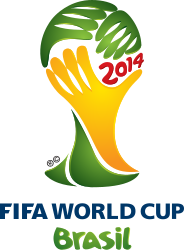 2014 FIFA World Cup official logo Juntos num só ritmo (Together in one rhythm) | |
| Tournament details | |
| Host country | Brazil |
| Dates | 12 June – 13 July |
| Teams | 32 (from 5 confederations) |
| Venue(s) | 12 (in 12 host cities) |
| Final positions | |
| Champions | |
| Runners-up | |
| Third place | |
| Fourth place | |
| Tournament statistics | |
| Matches played | 64 |
| Goals scored | 171 (2.67 per match) |
| Attendance | 3,429,873 (53,592 per match) |
| Top scorer(s) | (6 goals)[1] |
| Best player(s) | |
| Best young player | |
| Best goalkeeper | |
| Fair play award | |
The 2014 FIFA World Cup was the 20th FIFA World Cup, the quadrennial world championship for men's national football teams organized by FIFA. It took place in Brazil from 12 June to 13 July 2014, after the country was awarded the hosting rights in 2007. It was the second time that Brazil staged the competition, the first being in 1950, and the fifth time that it was held in South America.
Thirty-one national teams advanced through qualification competitions to join the host nation in the final tournament (with Bosnia and Herzegovina as only debutant). A total of 64 matches were played in 12 venues located in as many host cities across Brazil. For the first time at a World Cup finals, match officials used goal-line technology, as well as vanishing spray for free kicks.[6]FIFA Fan Fests in each host city gathered a total of 5 million people, and the country received 1 million visitors from 202 countries.[7] Every World Cup-winning team since the first tournament in 1930 – Argentina, Brazil, England, France, Germany, Italy, Spain and Uruguay – qualified for this tournament. Spain, the title holders, were eliminated at the group stage, along with England and Italy. Uruguay were eliminated in the round of 16, and France exited in the quarter-finals. Host nation Brazil, who had won the 2013 FIFA Confederations Cup, lost to Germany 7–1 in the semi-finals and eventually finished in fourth place.
In the final, Germany defeated Argentina 1–0 to win the tournament and secure the country's fourth world title, the first after the German reunification in 1990, when as West Germany they also beat Argentina in the World Cup final. Germany became the first European team to win a World Cup staged in the Americas,[8] and this result marked the third consecutive title won by a European team, after Italy in 2006 and Spain in 2010.[9][10]
.mw-parser-output .toclimit-2 .toclevel-1 ul,.mw-parser-output .toclimit-3 .toclevel-2 ul,.mw-parser-output .toclimit-4 .toclevel-3 ul,.mw-parser-output .toclimit-5 .toclevel-4 ul,.mw-parser-output .toclimit-6 .toclevel-5 ul,.mw-parser-output .toclimit-7 .toclevel-6 ul{display:none}
Contents
1 Host selection
2 Participating teams and officials
2.1 Qualification
2.2 Final draw
2.3 Officials
2.4 Squads
3 Venues
3.1 Team base camps
3.2 FIFA Fan Fests
4 Innovations
4.1 Technologies
4.2 Cooling breaks
4.3 Anti-doping
5 Format
6 Opening ceremony
7 Group stage
7.1 Group A
7.2 Group B
7.3 Group C
7.4 Group D
7.5 Group E
7.6 Group F
7.7 Group G
7.8 Group H
8 Knockout stage
8.1 Round of 16
8.2 Quarter-finals
8.3 Semi-finals
8.4 Third place play-off
8.5 Final
9 Statistics
9.1 Goalscorers
9.2 Discipline
9.3 Awards
9.4 Dream Team
9.5 Prize money
9.6 Final standings
10 Preparations and costs
11 Marketing
12 Sponsorship
13 Media
14 Controversies
14.1 Protests
14.2 Breaches into stadiums
14.3 Bridge collapse
14.4 Head injuries
15 See also
16 Notes
17 References
18 External links
Host selection
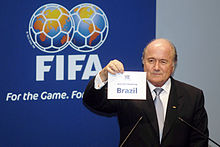
Announcing of Brazil as hosts, 2007
In March 2003, FIFA announced that the tournament would be held in South America for the first time since 1978, in line with its then-active policy of rotating the right to host the World Cup among different confederations.[11][12] With the 2010 FIFA World Cup hosted in South Africa, it would be the second consecutive World Cup outside Europe, which was a first for the tournament. It was also second in the Southern Hemisphere.[13] Only Brazil and Colombia formally declared their candidacy but, after the withdrawal of the latter from the process,[14] Brazil was officially elected as host nation unopposed on 30 October 2007.[15]
Participating teams and officials
Qualification
Following qualification matches played between June 2011 and November 2013, the following 32 teams – shown with their last pre-tournament FIFA world ranking[16] – qualified for the final tournament. Twenty-four of these teams were returning participants from the 2010 World Cup. Bosnia and Herzegovina were the only team with no previous appearance at the World Cup finals.[nb 2][17]Colombia qualified for the World Cup after 16 years of absence, while the 2018 World Cup hosts Russia and Belgium returned after 12 years. Paraguay failed to qualify for the first time since 1994. This was also the first World Cup for 32 years that did not feature a representative from the Nordic countries. The highest ranked team not to qualify was Ukraine (ranked 16th), while the lowest ranked team that did qualify was Australia (ranked 62nd).[16]
|
|
| 
|
| Teams listed by FIFA ranking as of June 2014[16] | |||
|---|---|---|---|
| Country | Confederation | Rank | |
| 1 | UEFA | 1 | |
| 2 | UEFA | 2 | |
| 3 | CONMEBOL | 3 | |
| 4 | UEFA | 4 | |
| 5 | CONMEBOL | 5 | |
| 6 | UEFA | 6 | |
| 7 | CONMEBOL | 7 | |
| 8 | CONMEBOL | 8 | |
| 9 | UEFA | 9 | |
| 10 | UEFA | 10 | |
| 11 | UEFA | 11 | |
| 12 | UEFA | 12 | |
| 13 | CONCACAF | 13 | |
| 14 | CONMEBOL | 14 | |
| 15 | UEFA | 15 | |
| 16 | UEFA | 17 | |
| 17 | UEFA | 18 | |
| 18 | UEFA | 19 | |
| 19 | CONCACAF | 20 | |
| 20 | UEFA | 21 | |
| 21 | CAF | 22 | |
| 22 | CAF | 23 | |
| 23 | CONMEBOL | 26 | |
| 24 | CONCACAF | 28 | |
| 25 | CONCACAF | 33 | |
| 26 | CAF | 37 | |
| 27 | AFC | 43 | |
| 28 | CAF | 44 | |
| 29 | AFC | 46 | |
| 30 | CAF | 56 | |
| 31 | AFC | 57 | |
| 32 | AFC | 62 | |
Final draw
The 32 participating teams were drawn into eight groups. In preparation for this, the teams were organised into four pots with the seven highest-ranked teams joining host nation Brazil in the seeded pot.[18] As with the previous tournaments, FIFA aimed to create groups which maximised geographic separation and therefore the unseeded teams were arranged into pots based on geographic considerations.[19][20] The draw took place on 6 December 2013 at the Costa do Sauípe resort in Bahia, during which the teams were drawn by various past World Cup-winning players.[21][22] Under the draw procedure, one randomly drawn team – Italy – was firstly relocated from Pot 4 to Pot 2 to create four equal pots of eight teams.[19]
Officials
In March 2013, FIFA published a list of 52 prospective referees, each paired, on the basis of nationality, with two assistant referees, from all six football confederations for the tournament. On 14 January 2014, the FIFA Referees Committee appointed 25 referee trios and eight support duos representing 43 countries for the tournament.[23][24]Yuichi Nishimura from Japan acted as referee in the opening match whereas Nicola Rizzoli from Italy acted as referee in the final.[25][26]
| List of officials | ||||
|---|---|---|---|---|
| Confederation | Referee | Assistants | Support (referee/assist) | |
AFC | Ravshan Irmatov (Uzbekistan) | Abdukhamidullo Rasulov (Uzbekistan) | Bakhadyr Kochkarov (Kyrgyzstan) | Alireza Faghani (Iran) / Hassan Kamranifar (Iran) |
Yuichi Nishimura (Japan) | Toru Sagara (Japan) | Toshiyuki Nagi (Japan) | ||
Nawaf Shukralla (Bahrain) | Yaser Tulefat (Bahrain) | Ebrahim Saleh (Bahrain) | ||
Ben Williams (Australia) | Matthew Cream (Australia) | Hakan Anaz (Australia) | ||
CAF | Noumandiez Doué (Ivory Coast) | Songuifolo Yeo (Ivory Coast) | Jean-Claude Birumushahu (Burundi) | Néant Alioum (Cameroon) / Djibril Camara (Senegal) |
Bakary Gassama (Gambia) | Evarist Menkouande (Cameroon) | Félicien Kabanda (Rwanda) | ||
Djamel Haimoudi (Algeria) | Rédouane Achik (Morocco) | Abdelhalk Etchiali (Algeria) | ||
CONCACAF | Joel Aguilar (El Salvador) | William Torres (El Salvador) | Juan Zumba (El Salvador) | Roberto Moreno (Panama) / Eric Boria (United States) Walter López (Guatemala) / Leonel Leal (Costa Rica) |
Mark Geiger (United States) | Mark Hurd (United States) | Joe Fletcher (Canada) | ||
Marco Rodríguez (Mexico) | Marvin Torrentera (Mexico) | Marcos Quintero (Mexico) | ||
CONMEBOL | Néstor Pitana (Argentina) | Hernán Maidana (Argentina) | Juan Pablo Belatti (Argentina) | Víctor Hugo Carrillo (Peru) / Rodney Aquino (Paraguay) |
Sandro Ricci (Brazil) | Emerson De Carvalho (Brazil) | Marcelo Van Gasse (Brazil) | ||
Enrique Osses (Chile) | Carlos Astroza (Chile) | Sergio Román (Chile) | ||
Wilmar Roldán (Colombia) | Humberto Clavijo (Colombia) | Eduardo Díaz (Colombia) | ||
Carlos Vera (Ecuador) | Christian Lescano (Ecuador) | Byron Romero (Ecuador) | ||
OFC | Peter O'Leary (New Zealand) | Jan-Hendrik Hintz (New Zealand) | Mark Rule (New Zealand) | Norbert Hauata (Tahiti) / Aden Marwa (Kenya) |
UEFA | Felix Brych (Germany) | Stefan Lupp (Germany) | Mark Borsch (Germany) | Svein Oddvar Moen (Norway) / Kim Haglund (Norway) |
Cüneyt Çakır (Turkey) | Bahattin Duran (Turkey) | Tarık Ongun (Turkey) | ||
Jonas Eriksson (Sweden) | Mathias Klasenius (Sweden) | Daniel Wärnmark (Sweden) | ||
Björn Kuipers (Netherlands) | Sander van Roekel (Netherlands) | Erwin Zeinstra (Netherlands) | ||
Milorad Mažić (Serbia) | Milovan Ristić (Serbia) | Dalibor Đurđević (Serbia) | ||
Pedro Proença (Portugal) | Bertino Miranda (Portugal) | Tiago Trigo (Portugal) | ||
Nicola Rizzoli (Italy) | Renato Faverani (Italy) | Andrea Stefani (Italy) | ||
Carlos Velasco Carballo (Spain) | Roberto Alonso Fernández (Spain) | Juan Carlos Yuste Jiménez (Spain) | ||
Howard Webb (England) | Michael Mullarkey (England) | Darren Cann (England) | ||
Squads
As with the 2010 tournament, each team's squad consists of 23 players (three of whom must be goalkeepers). Each participating national association had to confirm their final 23-player squad no later than 10 days before the start of the tournament.[27] Teams were permitted to make late replacements in the event of serious injury, at any time up to 24 hours before their first game.[27] During a match, all remaining squad members not named in the starting team are available to be one of the three permitted substitutions (provided the player is not serving a suspension).[27]
Venues
12 venues (seven new and five renovated) in twelve cities were selected for the tournament. The venues covered all the main regions of Brazil and created more evenly distributed hosting than the 1950 finals in Brazil.[28] Consequently, the tournament required long-distance travel for teams.[29] During the World Cup, Brazilian cities were also home to the participating teams at 32 separate base camps,[30] as well as staging official fan fests where supporters could view the games.[31]
The most used stadiums were the Maracana and Brasilia, which hosted seven matches each. The least-used venues were in Cuiaba, Manaus, Natal and Curitiba, which hosted four matches each; as the four smallest stadiums in use at the tournament, they did not host any knockout round matches.[32]
Rio de Janeiro | Brasília | São Paulo | Fortaleza |
|---|---|---|---|
Estádio do Maracanã | Estádio Nacional | Arena de São Paulo | Estádio Castelão |
Capacity: 74,738[32] | Capacity: 69,432[32] | Capacity: 63,321[32] | Capacity: 60,348[32] |
 | 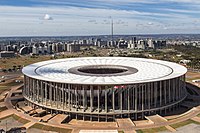 | 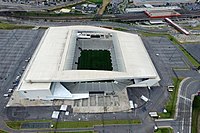 | 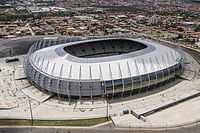 |
Belo Horizonte |  Belo Horizonte Brasília Fortaleza Porto Alegre São Paulo Rio de Janeiro Salvador Natal Cuiabá Curitiba Manaus Recife | Salvador | |
Estádio Mineirão | Arena Fonte Nova | ||
| Capacity: 58,259[32] | Capacity: 51,708[32] | ||
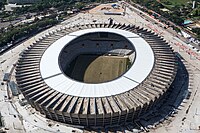 | 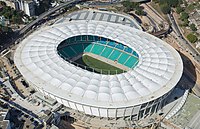 | ||
Porto Alegre | Recife [nb 3] | ||
Estádio Beira-Rio | Arena Pernambuco | ||
| Capacity: 43,394[32] | Capacity: 42,583[32] | ||
 |  | ||
Cuiabá | Manaus | Natal | Curitiba |
Arena Pantanal | Arena da Amazônia | Arena das Dunas | Arena da Baixada |
| Capacity: 41,112[32] | Capacity: 40,549[32] | Capacity: 39,971[32] | Capacity: 39,631[32] |
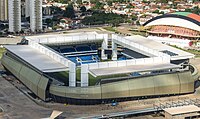 |  | 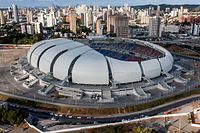 | 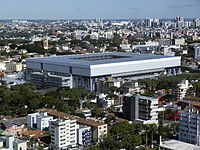 |
Team base camps
Base camps were used by the 32 national squads to stay and train before and during the World Cup tournament. On 31 January 2014, FIFA announced the base camps for each participating team,[30] having earlier circulated a brochure of 84 prospective locations.[33] Most teams opted to stay in the Southeast Region of Brazil, with only eight teams choosing other regions; five teams (Croatia, Germany, Ghana, Greece and Switzerland) opted to stay in the Northeast Region and three teams (Ecuador, South Korea and Spain) opted to stay in the South Region. None opted to stay in the North Region or the Central-West Region.[34]
| National squads' base camps | |||||||||||||||||||||||||||||||||||||||||||||||||||||||||||||||||||||
|---|---|---|---|---|---|---|---|---|---|---|---|---|---|---|---|---|---|---|---|---|---|---|---|---|---|---|---|---|---|---|---|---|---|---|---|---|---|---|---|---|---|---|---|---|---|---|---|---|---|---|---|---|---|---|---|---|---|---|---|---|---|---|---|---|---|---|---|---|---|
|
| ||||||||||||||||||||||||||||||||||||||||||||||||||||||||||||||||||||

Brazilian football fans at the FIFA Fan Fest in Brasília.
FIFA Fan Fests
For a third consecutive World Cup tournament, FIFA staged FIFA Fan Fests in each of the 12 host cities throughout the competition. Prominent examples were the Copacabana Beach in Rio de Janeiro, which already held a Fan Fest in 2010, and São Paulo's Vale do Anhangabaú.[35][36] The first official event took place on Iracema Beach, in Fortaleza, on 8 June 2014.[37]
Innovations
Technologies

Adidas Brazuca
To avoid ghost goals the 2014 World Cup introduced goal-line technology following successful trials at among others 2013 Confederations Cup. The chosen Goal Control system featured 14 high speed cameras, 7 directed to each of the goals. Data were sent to the central image-processing centre, where a virtual representation of the ball was output on a widescreen to confirm the goal. The referee was equipped with a watch which vibrated and displayed a signal upon a goal.[38][39][40] France's second goal in their group game against Honduras was the first time goal-line technology was needed to confirm that a goal should be given.[41]
Following successful trials,[nb 4] FIFA approved the use of vanishing spray by the referees for the first time at a World Cup Finals. The water-based spray, which disappears within minutes of application, can be used to mark a ten-yard line for the defending team during a free kick and also to draw where the ball is to be placed for a free kick.[42]
The Adidas Brazuca was the official match ball of the 2014 FIFA World Cup[43][44][45][46] and was supplied by Forward Sports of Sialkot, Pakistan.[43] Adidas created a new design of ball after criticisms of the Adidas Jabulani used in the previous World Cup. The number of panels was reduced to six, with the panels being thermally bonded. This created a ball with increased consistency and aerodynamics compared to its predecessor. Furthermore, Adidas underwent an extensive testing process lasting more than two years to produce a ball that would meet the approval of football professionals.
Cooling breaks
Because of the relatively high ambient temperatures in Brazil, particularly at the northern venues, cooling breaks for the players were introduced.[47] Breaks could take place at the referee's discretion after the 30th minute of each half if the Wet Bulb Globe Temperature exceeded 32 °C (90 °F).
The first cooling break in World Cup play took place during the 32nd minute of the match between the Netherlands and Mexico in the round of 16.[48][49][50][51] At the start of the match, FIFA listed the temperature at 32 °C (90 °F) with 68% humidity.[52]
Anti-doping
The biological passport was introduced in the FIFA World Cup starting in 2014. Blood and urine samples from all players before the competition, and from two players per team per match, are analysed by the Swiss Laboratory for Doping Analyses.[53] FIFA reported that 91.5% of the players taking part in the tournament were tested before the start of the competition and none tested positive.[54] However, FIFA was criticised for how it conducted doping tests.[55][56]
Format
The first round, or group stage, was a competition between the 32 teams divided among eight groups of four, where each group engaged in a round-robin tournament within itself. The two highest ranked teams in each group advanced to the knockout stage.[27] Teams were awarded three points for a win and one for a draw. When comparing teams in a group over-all result came before head-to-head.
| Tie-breaking criteria for group play |
|---|
The ranking of teams in each group was based on the following criteria:
|
In the knockout stage there were four rounds (round of 16, quarter-finals, semi-finals, and the final), with each eliminating the losers. The two semi-final losers competed in a third place play-off. For any match in the knockout stage, a draw after 90 minutes of regulation time was followed by two 15 minute periods of extra time to determine a winner. If the teams were still tied, a penalty shoot-out was held to determine a winner.[27]
The match schedule was announced on 20 October 2011[57] with the kick-off times being confirmed on 27 September 2012;[58] after the final draw, the kick-off times of seven matches were adjusted by FIFA.[59] The competition was organised so that teams that played each other in the group stage could not meet again during the knockout phase until the final (or the 3rd place match).[27]
The group stage began on 12 June, with the host nation competing in the opening game as has been the format since the 2006 tournament. The opening game was preceded by an opening ceremony that began at 15:15 local time.[60]
Opening ceremony
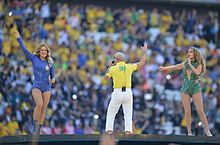
From left to right: Claudia Leitte, Pitbull, and Jennifer Lopez performing at the opening ceremony at the Arena de São Paulo, São Paulo.
On 12 June 2014, the 20th addition of the FIFA World Cup got underway with the opening ceremony at Arena de São Paulo, São Paulo, Brazil. The event saw 660 dancers take to the stadium and perform in a ceremony which celebrated the nature of the country and its love of football. Following the dancers native singer Claudia Leitte emerged on cetre stage to perform to the crowd. She was later joined by Cuban, American rapper Pitbull, and American singer Jennifer Lopez to perform the tournament's official song "We Are One (Ole Ola)" which saw official single release on 8 April 2014. Following the ceremony the opening match was played which saw the hosts come from behind to beat Croatia 3-1.[61][62][63]
Group stage
The group stage of the cup took place in Brazil from 12 June 2014 to 26 June 2014: each team played three games. The group stage was notable for a scarcity of draws and a large number of goals. The first drawn (and goalless) match did not occur until the 13th match of the tournament, between Iran and Nigeria: a drought longer than any World Cup since 1930.[64] The group stage produced a total of 136 goals (an average of 2.83 goals per match), nine fewer than were scored during the entire 2010 tournament.[65] This is the largest number of goals in the group stage since the 32-team system was implemented in 1998[66] and the largest average in a group stage since 1958.[67] World Cup holders Spain were eliminated after only two games, the quickest exit for the defending champions since Italy's from the 1950 tournament.[68] Spain also became the fourth nation to be eliminated in the first round while holding the World Cup crown, the first one being Italy in 1950 (and again in 2010), the second Brazil in 1966, and the third France in 2002.[69]
Group A
Pos | Team | Pld | W | D | L | GF | GA | GD | Pts | Qualification |
|---|---|---|---|---|---|---|---|---|---|---|
| 1 | 3 | 2 | 1 | 0 | 7 | 2 | +5 | 7 | Advance to knockout stage | |
| 2 | 3 | 2 | 1 | 0 | 4 | 1 | +3 | 7 | ||
| 3 | 3 | 1 | 0 | 2 | 6 | 6 | 0 | 3 | ||
| 4 | 3 | 0 | 0 | 3 | 1 | 9 | −8 | 0 |
(H) Host.
| 12 June 2014 | |||
Brazil | 3–1 | Arena de São Paulo, São Paulo | |
| 13 June 2014 | |||
Mexico | 1–0 | Arena das Dunas, Natal | |
| 17 June 2014 | |||
Brazil | 0–0 | Estádio Castelão, Fortaleza | |
| 18 June 2014 | |||
Cameroon | 0–4 | Arena da Amazônia, Manaus | |
| 23 June 2014 | |||
Cameroon | 1–4 | Estádio Nacional Mané Garrincha, Brasília | |
Croatia | 1–3 | Itaipava Arena Pernambuco, Recife |
Group B
Pos | Team | Pld | W | D | L | GF | GA | GD | Pts | Qualification |
|---|---|---|---|---|---|---|---|---|---|---|
| 1 | 3 | 3 | 0 | 0 | 10 | 3 | +7 | 9 | Advance to knockout stage | |
| 2 | 3 | 2 | 0 | 1 | 5 | 3 | +2 | 6 | ||
| 3 | 3 | 1 | 0 | 2 | 4 | 7 | −3 | 3 | ||
| 4 | 3 | 0 | 0 | 3 | 3 | 9 | −6 | 0 |
| 13 June 2014 | |||
Spain | 1–5 | Itaipava Arena Fonte Nova, Salvador | |
Chile | 3–1 | Arena Pantanal, Cuiabá | |
| 18 June 2014 | |||
Australia | 2–3 | Estádio Beira-Rio, Porto Alegre | |
Spain | 0–2 | Estádio do Maracanã, Rio de Janeiro | |
| 23 June 2014 | |||
Australia | 0–3 | Arena da Baixada, Curitiba | |
Netherlands | 2–0 | Arena de São Paulo, São Paulo |
Group C
Pos | Team | Pld | W | D | L | GF | GA | GD | Pts | Qualification |
|---|---|---|---|---|---|---|---|---|---|---|
| 1 | 3 | 3 | 0 | 0 | 9 | 2 | +7 | 9 | Advance to knockout stage | |
| 2 | 3 | 1 | 1 | 1 | 2 | 4 | −2 | 4 | ||
| 3 | 3 | 1 | 0 | 2 | 4 | 5 | −1 | 3 | ||
| 4 | 3 | 0 | 1 | 2 | 2 | 6 | −4 | 1 |
| 14 June 2014 | |||
Colombia | 3–0 | Estádio Mineirão, Belo Horizonte | |
Ivory Coast | 2–1 | Itaipava Arena Pernambuco, Recife | |
| 19 June 2014 | |||
Colombia | 2–1 | Estádio Nacional Mané Garrincha, Brasília | |
Japan | 0–0 | Arena das Dunas, Natal | |
| 24 June 2014 | |||
Japan | 1–4 | Arena Pantanal, Cuiabá | |
Greece | 2–1 | Estádio Castelão, Fortaleza |
Group D
Pos | Team | Pld | W | D | L | GF | GA | GD | Pts | Qualification |
|---|---|---|---|---|---|---|---|---|---|---|
| 1 | 3 | 2 | 1 | 0 | 4 | 1 | +3 | 7 | Advance to knockout stage | |
| 2 | 3 | 2 | 0 | 1 | 4 | 4 | 0 | 6 | ||
| 3 | 3 | 1 | 0 | 2 | 2 | 3 | −1 | 3 | ||
| 4 | 3 | 0 | 1 | 2 | 2 | 4 | −2 | 1 |
| 14 June 2014 | |||
Uruguay | 1–3 | Estádio Castelão, Fortaleza | |
England | 1–2 | Arena da Amazônia, Manaus | |
| 19 June 2014 | |||
Uruguay | 2–1 | Arena de São Paulo, São Paulo | |
| 20 June 2014 | |||
Italy | 0–1 | Itaipava Arena Pernambuco, Recife | |
| 24 June 2014 | |||
Italy | 0–1 | Arena das Dunas, Natal | |
Costa Rica | 0–0 | Estádio Mineirão, Belo Horizonte |
Group E
Pos | Team | Pld | W | D | L | GF | GA | GD | Pts | Qualification |
|---|---|---|---|---|---|---|---|---|---|---|
| 1 | 3 | 2 | 1 | 0 | 8 | 2 | +6 | 7 | Advance to knockout stage | |
| 2 | 3 | 2 | 0 | 1 | 7 | 6 | +1 | 6 | ||
| 3 | 3 | 1 | 1 | 1 | 3 | 3 | 0 | 4 | ||
| 4 | 3 | 0 | 0 | 3 | 1 | 8 | −7 | 0 |
| 15 June 2014 | |||
Switzerland | 2–1 | Estádio Nacional Mané Garrincha, Brasília | |
France | 3–0 | Estádio Beira-Rio, Porto Alegre | |
| 20 June 2014 | |||
Switzerland | 2–5 | Itaipava Arena Fonte Nova, Salvador | |
Honduras | 1–2 | Arena da Baixada, Curitiba | |
| 25 June 2014 | |||
Honduras | 0–3 | Arena da Amazônia, Manaus | |
Ecuador | 0–0 | Estádio do Maracanã, Rio de Janeiro |
Group F
Pos | Team | Pld | W | D | L | GF | GA | GD | Pts | Qualification |
|---|---|---|---|---|---|---|---|---|---|---|
| 1 | 3 | 3 | 0 | 0 | 6 | 3 | +3 | 9 | Advance to knockout stage | |
| 2 | 3 | 1 | 1 | 1 | 3 | 3 | 0 | 4 | ||
| 3 | 3 | 1 | 0 | 2 | 4 | 4 | 0 | 3 | ||
| 4 | 3 | 0 | 1 | 2 | 1 | 4 | −3 | 1 |
| 15 June 2014 | |||
Argentina | 2–1 | Estádio do Maracanã, Rio de Janeiro | |
| 16 June 2014 | |||
Iran | 0–0 | Arena da Baixada, Curitiba | |
| 21 June 2014 | |||
Argentina | 1–0 | Estádio Mineirão, Belo Horizonte | |
Nigeria | 1–0 | Arena Pantanal, Cuiabá | |
| 25 June 2014 | |||
Nigeria | 2–3 | Estádio Beira-Rio, Porto Alegre | |
Bosnia and Herzegovina | 3–1 | Itaipava Arena Fonte Nova, Salvador |
Group G
Pos | Team | Pld | W | D | L | GF | GA | GD | Pts | Qualification |
|---|---|---|---|---|---|---|---|---|---|---|
| 1 | 3 | 2 | 1 | 0 | 7 | 2 | +5 | 7 | Advance to knockout stage | |
| 2 | 3 | 1 | 1 | 1 | 4 | 4 | 0 | 4 | ||
| 3 | 3 | 1 | 1 | 1 | 4 | 7 | −3 | 4 | ||
| 4 | 3 | 0 | 1 | 2 | 4 | 6 | −2 | 1 |
| 16 June 2014 | |||
Germany | 4–0 | Itaipava Arena Fonte Nova, Salvador | |
Ghana | 1–2 | Arena das Dunas, Natal | |
| 21 June 2014 | |||
Germany | 2–2 | Estádio Castelão, Fortaleza | |
| 22 June 2014 | |||
United States | 2–2 | Arena da Amazônia, Manaus | |
| 26 June 2014 | |||
United States | 0–1 | Itaipava Arena Pernambuco, Recife | |
Portugal | 2–1 | Estádio Nacional Mané Garrincha, Brasília |
Group H
Pos | Team | Pld | W | D | L | GF | GA | GD | Pts | Qualification |
|---|---|---|---|---|---|---|---|---|---|---|
| 1 | 3 | 3 | 0 | 0 | 4 | 1 | +3 | 9 | Advance to knockout stage | |
| 2 | 3 | 1 | 1 | 1 | 6 | 5 | +1 | 4 | ||
| 3 | 3 | 0 | 2 | 1 | 2 | 3 | −1 | 2 | ||
| 4 | 3 | 0 | 1 | 2 | 3 | 6 | −3 | 1 |
| 17 June 2014 | |||
Belgium | 2–1 | Estádio Mineirão, Belo Horizonte | |
Russia | 1–1 | Arena Pantanal, Cuiabá | |
| 22 June 2014 | |||
Belgium | 1–0 | Estádio do Maracanã, Rio de Janeiro | |
South Korea | 2–4 | Estádio Beira-Rio, Porto Alegre | |
| 26 June 2014 | |||
South Korea | 0–1 | Arena de São Paulo, São Paulo | |
Algeria | 1–1 | Arena da Baixada, Curitiba |
Knockout stage
Round of 16 | Quarter-finals | Semi-finals | Final | |||||||||||
| 28 June – Belo Horizonte | ||||||||||||||
| 1 (3) | ||||||||||||||
| 4 July – Fortaleza | ||||||||||||||
| 1 (2) | ||||||||||||||
| 2 | ||||||||||||||
| 28 June – Rio de Janeiro | ||||||||||||||
| 1 | ||||||||||||||
| 2 | ||||||||||||||
8 July – Belo Horizonte | ||||||||||||||
| 0 | ||||||||||||||
| 1 | ||||||||||||||
| 30 June – Brasília | ||||||||||||||
7 | ||||||||||||||
| 2 | ||||||||||||||
| 4 July – Rio de Janeiro | ||||||||||||||
| 0 | ||||||||||||||
| 0 | ||||||||||||||
| 30 June – Porto Alegre | ||||||||||||||
1 | ||||||||||||||
2 | ||||||||||||||
13 July – Rio de Janeiro | ||||||||||||||
| 1 | ||||||||||||||
| 1 | ||||||||||||||
| 29 June – Fortaleza | ||||||||||||||
| 0 | ||||||||||||||
| 2 | ||||||||||||||
| 5 July – Salvador | ||||||||||||||
| 1 | ||||||||||||||
0 (4) | ||||||||||||||
| 29 June – Recife | ||||||||||||||
| 0 (3) | ||||||||||||||
| 1 (5) | ||||||||||||||
| 9 July – São Paulo | ||||||||||||||
| 1 (3) | ||||||||||||||
| 0 (2) | ||||||||||||||
| 1 July – São Paulo | ||||||||||||||
0 (4) | Third place | |||||||||||||
1 | ||||||||||||||
| 5 July – Brasília | 12 July – Brasília | |||||||||||||
| 0 | ||||||||||||||
| 1 | 0 | |||||||||||||
| 1 July – Salvador | ||||||||||||||
| 0 | 3 | |||||||||||||
| 2 | ||||||||||||||
| 1 | ||||||||||||||
Scores after extra time are indicated by (aet), and penalty shoot-outs are indicated by (pen.).
Round of 16
For the first time since the introduction of a round of 16 after the group stage in 1986, all the group winners advanced into the quarter-finals.[70] They included four teams from UEFA, three from CONMEBOL, and one from CONCACAF. Of the eight matches, five required extra-time, and two of these required penalty shoot-outs; this was the first time penalty shoot-outs occurred in more than one game in a round of 16.[nb 5] The goal average per game in the round of 16 was 2.25, a drop of 0.58 goals per game from the group stage.[71] The eight teams to win in the round of 16 included four former champions (Brazil, Germany, Argentina and France), a three-time runner-up (Netherlands), and two first-time quarter-finalists (Colombia and Costa Rica).[72][73] Belgium reached the quarter-finals for the first time since 1986.[74]
All times listed below are at local time (UTC−3)
.mw-parser-output .footballbox{clear:both;overflow:auto}.mw-parser-output .footballbox .ftitle{text-align:center;font-weight:bold}.mw-parser-output .footballbox .fleft{float:left;width:15%;padding:2px 0;overflow:auto}.mw-parser-output .footballbox time{display:block;overflow:auto}.mw-parser-output .footballbox .fdate{display:block;float:right;text-align:right}.mw-parser-output .footballbox .ftime{display:block;clear:right;float:right;text-align:right}.mw-parser-output .footballbox .frnd{clear:right;float:right;text-align:right}.mw-parser-output .footballbox .fevent{float:left;width:61%;table-layout:fixed;text-align:center}.mw-parser-output .footballbox tr{vertical-align:top}.mw-parser-output .footballbox .fhome{width:39%;text-align:right}.mw-parser-output .footballbox .fscore{width:22%}.mw-parser-output .footballbox .faway{width:39%;text-align:left}.mw-parser-output .footballbox .fgoals{font-size:85%}.mw-parser-output .footballbox .fhgoal{text-align:right}.mw-parser-output .footballbox .fagoal{text-align:left}.mw-parser-output .footballbox .fright{float:left;font-size:85%;width:24%;padding:2px 0}
| Brazil | 1–1 (a.e.t.) | |
|---|---|---|
| Report |
|
| Penalties | ||
| 3–2 |
|
| Colombia | 2–0 | |
|---|---|---|
| Report |
| Netherlands | 2–1 | |
|---|---|---|
| Report |
|
| Costa Rica | 1–1 (a.e.t.) | |
|---|---|---|
| Report |
|
| Penalties | ||
| 5–3 |
|
| France | 2–0 | |
|---|---|---|
| Report |
| Germany | 2–1 (a.e.t.) | |
|---|---|---|
| Report |
|
| Argentina | 1–0 (a.e.t.) | |
|---|---|---|
| Report |
| Belgium | 2–1 (a.e.t.) | |
|---|---|---|
| Report |
|
Quarter-finals
With a 1–0 victory over France, Germany set a World Cup record with four consecutive semi-final appearances. Brazil beat Colombia 2–1, but Brazil's Neymar was injured and missed the rest of the competition. Argentina reached the final four for the first time since 1990 after a 1–0 win over Belgium. The Netherlands reached the semi-finals for the second consecutive tournament, after overcoming Costa Rica in a penalty shoot-out following a 0–0 draw at the end of extra time.
| France | 0–1 | |
|---|---|---|
| Report |
|
| Brazil | 2–1 | |
|---|---|---|
| Report |
|
| Argentina | 1–0 | |
|---|---|---|
| Report |
| Netherlands | 0–0 (a.e.t.) | |
|---|---|---|
| Report | ||
| Penalties | ||
| 4–3 |
|
Semi-finals
Germany qualified for the final for the eighth time with a historic 7–1 win over Brazil – the biggest defeat in Brazilian football since 1920. Miroslav Klose's goal in this match was his 16th throughout all World Cups, breaking the record he had previously shared with Ronaldo.[75] Klose set another record by becoming the first player to appear in four World Cup semi-finals.[76] Argentina reached their first final since 1990, and the fifth overall after overcoming the Netherlands in a penalty shoot-out following a 0–0 draw at the end of extra time.
| Brazil | 1–7 | |
|---|---|---|
| Report |
|
| Netherlands | 0–0 (a.e.t.) | |
|---|---|---|
| Report | ||
| Penalties | ||
| 2–4 |
|
Third place play-off
The Netherlands defeated Brazil 3–0 to secure third place, the first for the Dutch team in their history. Overall, Brazil conceded 14 goals in the tournament; this was the most by a team at any single World Cup since 1986, and the most by a host nation in history, although their fourth-place finish still represented Brazil's best result in a World Cup since their last win in 2002.[77]
| Brazil | 0–3 | |
|---|---|---|
| Report |
|
Final
The final featured Germany against Argentina for a record third time after 1986 and 1990.
| Germany | 1–0 (a.e.t.) | |
|---|---|---|
| Report |
This marked the first time that teams from the same continent had won three consecutive World Cups (following Italy in 2006 and Spain in 2010). It was also the first time that a European nation had won the World Cup in the Americas. On aggregate Europe then had 11 victories, compared to South America's 9 victories.
Statistics
Goalscorers
In total, 171 goals were scored by a record 121 players, with five credited as own goals. Goals scored from penalty shoot-outs are not counted.
James Rodríguez was awarded the Golden Boot for scoring six goals, the first time that a Colombian player received the award.
- 6 goals
 James Rodríguez
James Rodríguez
- 5 goals
 Thomas Müller
Thomas Müller
- 4 goals
 Lionel Messi
Lionel Messi
 Neymar
Neymar
 Robin van Persie
Robin van Persie
- 3 goals
 Enner Valencia
Enner Valencia
 Karim Benzema
Karim Benzema
 André Schürrle
André Schürrle
 Arjen Robben
Arjen Robben
 Xherdan Shaqiri
Xherdan Shaqiri
- 2 goals
 Abdelmoumene Djabou
Abdelmoumene Djabou
 Islam Slimani
Islam Slimani
 Tim Cahill
Tim Cahill
 David Luiz
David Luiz
 Oscar
Oscar
 Alexis Sánchez
Alexis Sánchez
 Jackson Martínez
Jackson Martínez
 Bryan Ruiz
Bryan Ruiz
 Mario Mandžukić
Mario Mandžukić
 Ivan Perišić
Ivan Perišić
 Mario Götze
Mario Götze
 Mats Hummels
Mats Hummels
 Miroslav Klose
Miroslav Klose
 Toni Kroos
Toni Kroos
 André Ayew
André Ayew
 Asamoah Gyan
Asamoah Gyan
 Wilfried Bony
Wilfried Bony
 Gervinho
Gervinho
 Memphis Depay
Memphis Depay
 Ahmed Musa
Ahmed Musa
 Clint Dempsey
Clint Dempsey
 Luis Suárez
Luis Suárez
- 1 goal
 Yacine Brahimi
Yacine Brahimi
 Sofiane Feghouli
Sofiane Feghouli
 Rafik Halliche
Rafik Halliche
 Ángel Di María
Ángel Di María
 Gonzalo Higuaín
Gonzalo Higuaín
 Marcos Rojo
Marcos Rojo
 Mile Jedinak
Mile Jedinak
 Kevin De Bruyne
Kevin De Bruyne
 Marouane Fellaini
Marouane Fellaini
 Romelu Lukaku
Romelu Lukaku
 Dries Mertens
Dries Mertens
 Divock Origi
Divock Origi
 Jan Vertonghen
Jan Vertonghen
 Edin Džeko
Edin Džeko
 Vedad Ibišević
Vedad Ibišević
 Miralem Pjanić
Miralem Pjanić
 Avdija Vršajević
Avdija Vršajević
 Fernandinho
Fernandinho
 Fred
Fred
 Thiago Silva
Thiago Silva
 Joël Matip
Joël Matip
 Charles Aránguiz
Charles Aránguiz
 Jean Beausejour
Jean Beausejour
 Jorge Valdivia
Jorge Valdivia
 Eduardo Vargas
Eduardo Vargas
 Pablo Armero
Pablo Armero
 Juan Cuadrado
Juan Cuadrado
 Teófilo Gutiérrez
Teófilo Gutiérrez
 Juan Quintero
Juan Quintero
 Joel Campbell
Joel Campbell
 Óscar Duarte
Óscar Duarte
 Marco Ureña
Marco Ureña
 Ivica Olić
Ivica Olić
 Wayne Rooney
Wayne Rooney
 Daniel Sturridge
Daniel Sturridge
 Olivier Giroud
Olivier Giroud
 Blaise Matuidi
Blaise Matuidi
 Paul Pogba
Paul Pogba
 Moussa Sissoko
Moussa Sissoko
 Mathieu Valbuena
Mathieu Valbuena
 Sami Khedira
Sami Khedira
 Mesut Özil
Mesut Özil
 Sokratis Papastathopoulos
Sokratis Papastathopoulos
 Georgios Samaras
Georgios Samaras
 Andreas Samaris
Andreas Samaris
 Carlo Costly
Carlo Costly
 Reza Ghoochannejhad
Reza Ghoochannejhad
 Mario Balotelli
Mario Balotelli
 Claudio Marchisio
Claudio Marchisio
 Keisuke Honda
Keisuke Honda
 Shinji Okazaki
Shinji Okazaki
 Giovani dos Santos
Giovani dos Santos
 Andrés Guardado
Andrés Guardado
 Javier Hernández
Javier Hernández
 Rafael Márquez
Rafael Márquez
 Oribe Peralta
Oribe Peralta
 Daley Blind
Daley Blind
 Stefan de Vrij
Stefan de Vrij
 Leroy Fer
Leroy Fer
 Klaas-Jan Huntelaar
Klaas-Jan Huntelaar
 Wesley Sneijder
Wesley Sneijder
 Georginio Wijnaldum
Georginio Wijnaldum
 Peter Odemwingie
Peter Odemwingie
 Cristiano Ronaldo
Cristiano Ronaldo
 Nani
Nani
 Silvestre Varela
Silvestre Varela
 Aleksandr Kerzhakov
Aleksandr Kerzhakov
 Aleksandr Kokorin
Aleksandr Kokorin
 Koo Ja-cheol
Koo Ja-cheol
 Lee Keun-ho
Lee Keun-ho
 Son Heung-min
Son Heung-min
 Xabi Alonso
Xabi Alonso
 Juan Mata
Juan Mata
 Fernando Torres
Fernando Torres
 David Villa
David Villa
 Blerim Džemaili
Blerim Džemaili
 Admir Mehmedi
Admir Mehmedi
 Haris Seferović
Haris Seferović
 Granit Xhaka
Granit Xhaka
 John Brooks
John Brooks
 Julian Green
Julian Green
 Jermaine Jones
Jermaine Jones
 Edinson Cavani
Edinson Cavani
 Diego Godín
Diego Godín
- Own goals
 Sead Kolašinac (against Argentina)
Sead Kolašinac (against Argentina)
 Marcelo (against Croatia)
Marcelo (against Croatia)
 John Boye (against Portugal)
John Boye (against Portugal)
 Noel Valladares (against France)
Noel Valladares (against France)
 Joseph Yobo (against France)
Joseph Yobo (against France)
Source: FIFA[78]
Discipline
The most notable disciplinary case was that of Uruguayan striker Luis Suárez, who was suspended for nine international matches and banned from taking part in any football-related activity (including entering any stadium) for four months, following a biting incident on Italian defender Giorgio Chiellini. He was also fined CHF100,000.[79][80][81] After an appeal to the Court of Arbitration for Sport, Suárez was later allowed to participate in training and friendly matches with new club Barcelona.[82]
Awards
The following awards were given at the conclusion of the tournament:[83][84]
| Award | Winner | Other nominees |
|---|---|---|
Golden Ball |
|
|
Golden Boot |
| |
Golden Glove |
|
|
Best Young Player |
|
|
FIFA Fair Play Trophy |
|
- Technical Study Group
The members of the Technical Study Group, the committee that decided which players won the awards, were led by FIFA's head of the Technical Division Jean-Paul Brigger and featured:[89]
|
|
|
There were changes to the voting procedure for awards for the 2014 edition: while in 2010 accredited media were allowed to vote for the Golden Ball award,[90] in 2014 only the Technical Study Group could select the outcome.[91]
Dream Team
As was the case during the 2010 edition, FIFA did not release an official All-Star Team, but instead invited users of FIFA.com to elect their Dream Team.[92][93]
| Goalkeepers | Defenders | Midfielders | Forwards | Manager |
|---|---|---|---|---|
|
|
|
|
|
Castrol, the official sponsor of the tournament, released a team of the tournament based on their Castrol Performance Index, which evaluates player performances through statistical data. The team consisted of the players leading each position, with midfielder Toni Kroos ranked as the overall leader.[94]Lionel Messi, the Golden Ball recipient, finished fifth among forwards and was thus not included in the team.[95]
| Goalkeepers | Defenders | Midfielders | Forwards |
|---|---|---|---|
|
|
|
|
Prize money
The total prize money on offer for the tournament was confirmed by FIFA as US$576 million (including payments of $70 million to domestic clubs and $100 million as player insurances), a 37 percent increase from the amount allocated in the 2010 tournament. Before the tournament, each of the 32 entrants received $1.5 million for preparation costs. At the tournament, the prize money was distributed as follows:[96]
- $8 million – To each team eliminated at the group stage (16 teams)
- $9 million – To each team eliminated in the round of 16 (8 teams)
- $14 million – To each team eliminated in the quarter-finals (4 teams)
- $20 million – Fourth placed team
- $22 million – Third placed team
- $25 million – Runner-up
- $35 million – Winner
Final standings
Per statistical convention in football, matches decided in extra time are counted as wins and losses, while matches decided by penalty shoot-outs are counted as draws.[97]

Result of countries participating in the 2014 FIFA World Cup
Champion Runner-up | Third place Fourth place | Quarter-finals Round of 16 | Group stage |
Pos. | Team | G | Pld | W | D | L | Pts | GF | GA | GD |
|---|---|---|---|---|---|---|---|---|---|---|
| 1 | G | 7 | 6 | 1 | 0 | 19 | 18 | 4 | +14 | |
| 2 | F | 7 | 5 | 1 | 1 | 16 | 8 | 4 | +4 | |
| 3 | B | 7 | 5 | 2 | 0 | 17 | 15 | 4 | +11 | |
| 4 | A | 7 | 3 | 2 | 2 | 11 | 11 | 14 | -3 | |
Eliminated in the quarter-finals | ||||||||||
| 5 | C | 5 | 4 | 0 | 1 | 12 | 12 | 4 | +8 | |
| 6 | H | 5 | 4 | 0 | 1 | 12 | 6 | 3 | +3 | |
| 7 | E | 5 | 3 | 1 | 1 | 10 | 10 | 3 | +7 | |
| 8 | D | 5 | 2 | 3 | 0 | 9 | 5 | 2 | +3 | |
Eliminated in the round of 16 | ||||||||||
| 9 | B | 4 | 2 | 1 | 1 | 7 | 6 | 4 | +2 | |
| 10 | A | 4 | 2 | 1 | 1 | 7 | 5 | 3 | +2 | |
| 11 | E | 4 | 2 | 0 | 2 | 6 | 7 | 7 | 0 | |
| 12 | D | 4 | 2 | 0 | 2 | 6 | 4 | 6 | -2 | |
| 13 | C | 4 | 1 | 2 | 1 | 5 | 3 | 5 | -2 | |
| 14 | H | 4 | 1 | 1 | 2 | 4 | 7 | 7 | 0 | |
| 15 | G | 4 | 1 | 1 | 2 | 4 | 5 | 6 | -1 | |
| 16 | F | 4 | 1 | 1 | 2 | 4 | 3 | 5 | -2 | |
Eliminated in the group stage | ||||||||||
| 17 | E | 3 | 1 | 1 | 1 | 4 | 3 | 3 | 0 | |
| 18 | G | 3 | 1 | 1 | 1 | 4 | 4 | 7 | -3 | |
| 19 | A | 3 | 1 | 0 | 2 | 3 | 6 | 6 | 0 | |
| 20 | F | 3 | 1 | 0 | 2 | 3 | 4 | 4 | 0 | |
| 21 | C | 3 | 1 | 0 | 2 | 3 | 4 | 5 | -1 | |
| 22 | D | 3 | 1 | 0 | 2 | 3 | 2 | 3 | -1 | |
| 23 | B | 3 | 1 | 0 | 2 | 3 | 4 | 7 | -3 | |
| 24 | H | 3 | 0 | 2 | 1 | 2 | 2 | 3 | -1 | |
| 25 | G | 3 | 0 | 1 | 2 | 1 | 4 | 6 | -2 | |
| 26 | D | 3 | 0 | 1 | 2 | 1 | 2 | 4 | -2 | |
| 27 | H | 3 | 0 | 1 | 2 | 1 | 3 | 6 | -3 | |
| 28 | F | 3 | 0 | 1 | 2 | 1 | 1 | 4 | -3 | |
| 29 | C | 3 | 0 | 1 | 2 | 1 | 2 | 6 | -4 | |
| 30 | B | 3 | 0 | 0 | 3 | 0 | 3 | 9 | -6 | |
| 31 | E | 3 | 0 | 0 | 3 | 0 | 1 | 8 | -7 | |
| 32 | A | 3 | 0 | 0 | 3 | 0 | 1 | 9 | -8 | |
Preparations and costs
Costs of the tournament totalled $11.6 billion,[98] making it the most expensive World Cup to date,[99] until surpassed by 2018 FIFA World Cup which cost an estimated $14.2 billion.[100] FIFA was expected to spend US$2 billion on staging the finals,[101] with its greatest single expense being the US$576 million prize money pot.[96]
Although organisers originally estimated costs of US$1.1 billion,[102] a reported US$3.6 billion was ultimately spent on stadium works.[103][104] Five of the chosen host cities had brand new venues built specifically for the World Cup, while the Estádio Nacional Mané Garrincha in the capital Brasília was demolished and rebuilt, with the remaining six being extensively renovated.[105]
An additional R$3 billion (US$1.3 billion, €960 million, £780 million at June 2014 rates) was earmarked by the Brazilian government for investment in infrastructure works and projects for use during the 2014 World Cup and beyond.[106] However, the failed completion of many of the proposed works provoked discontent among some Brazilians.[107][108][109]
The Brazilian government pledged US$900 million to be invested into security forces and that the tournament would be "one of the most protected sports events in history."[110]
Marketing

Fuleco, the official mascot of the 2014 FIFA World Cup
The marketing of the 2014 FIFA World Cup included sale of tickets, support from sponsors and promotion through events that utilise the symbols and songs of the tournament. Popular merchandise included items featuring the official mascot as well as an official video game that has been developed by EA Sports.[111] The official song of the tournament was "We Are One (Ole Ola)" with vocals from Pitbull, Jennifer Lopez and Claudia Leitte.[112] As a partner of the German Football Association, the German airline Lufthansa renamed itself "Fanhansa" on some of its planes that flew the German national team, media representatives and football fans to Brazil.[113]
Sponsorship
The sponsors of the 2014 World Cup are divided into three categories: FIFA Partners, FIFA World Cup Sponsors and National Supporters.[114]
| FIFA partners | FIFA World Cup sponsors | National supporters | ||
|---|---|---|---|---|
|
|
|
Media
For a fourth consecutive FIFA World Cup Finals, the coverage was provided by HBS (Host Broadcast Services), a subsidiary of Infront Sports & Media.[115]Sony was selected as the official equipment provider and built 12 bespoke high definition production 40-foot-long containers, one for each tournament venue, to house the extensive amount of equipment required.[116][117] Each match utilised 37 standard camera plans, including Aerial and Cablecam, two Ultramotion cameras and dedicated cameras for interviews.[117]The official tournament film, as well as three matches,[nb 6] will be filmed with ultra high definition technology (4K resolution), following a successful trial at the 2013 FIFA Confederations Cup.[118]
The broadcasting rights – covering television, radio, internet and mobile coverage – for the tournament were sold to media companies in each individual territory either directly by FIFA, or through licensed companies or organisations such as the European Broadcasting Union, Organización de Televisión Iberoamericana, International Media Content, Dentsu and RS International Broadcasting & Sports Management.[119] The sale of these rights accounted for an estimated 60% of FIFA's income from staging a World Cup.[120] The International Broadcast Centre was situated at the Riocentro in the Barra da Tijuca neighbourhood of Rio de Janeiro.[121][122]
Worldwide, several games qualified as the most-watched sporting events in their country in 2014, including 42.9 million people in Brazil for the opening game between Brazil and Croatia, the 34.1 million in Japan who saw their team play Ivory Coast, and 34.7 million in Germany who saw their national team win the World Cup against Argentina,[123] while the 24.7 million viewers during the game between the USA and Portugal is joint with the 2010 final as the most-watched football game in the United States.[124] According to FIFA, over one billion people tuned in worldwide to watch the final between Germany and Argentina.[125]
Controversies
The 2014 FIFA World Cup generated various controversies, including demonstrations, some of which took place even before the tournament started. Furthermore, there were various issues with safety, including eight deaths of workers and a fire during construction, breaches into stadiums, an unstable makeshift staircase at the Maracanã Stadium, a monorail collapse, and the collapse of an unfinished overpass in Belo Horizonte.[126][127][128][129][130] The houses of thousands of families living in Rio de Janeiro’s slums were cleared for redevelopments for the World Cup in spite of protests and resistance. Favela do Metrô, near the Maracanã Stadium, was completely destroyed as a result, having previously housed 700 families in 2010.[131][132][133]
Protests
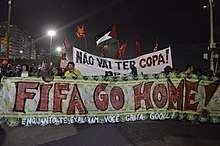
Anti-World Cup demonstration on the opening day
Prior to the opening ceremony of the 2013 FIFA Confederations Cup staged in Brazil, demonstrations took place outside the venue, organised by people unhappy with the amount of public money spent to enable the hosting of the FIFA World Cup.[134] Both the Brazilian president Dilma Rousseff and FIFA president Sepp Blatter were heavily booed as they were announced to give their speeches at the 2013 tournament's opening,[135] which resulted in FIFA announcing that the 2014 FIFA World Cup opening ceremony would not feature any speeches.[136] Further protests took place during the Confederations Cup as well as prior to and during the World Cup.[137][138][139][140][141]
Breaches into stadiums
At the Group B match between Spain and Chile, around 100 Chilean supporters who had gathered outside Maracanã Stadium forced their way into the stadium and caused damage to the media centre. Military police reported that 85 Chileans were detained during the events, while others reached the stands. Earlier, about 20 Argentinians made a similar breach during Argentina's Group F game against Bosnia and Herzegovina at the same stadium.[142][143]
Bridge collapse
On 3 July 2014, an overpass under construction in Belo Horizonte as part of the World Cup infrastructure projects collapsed onto a busy carriageway below, leaving two people dead and 22 others injured.[144][145]
Head injuries
During the tournament, FIFA received significant criticism for the way head injuries are handled during matches. Two incidents in particular attracted the most attention. First, in a group stage match, after Uruguayan defender Álvaro Pereira received a blow to the head, he lay unconscious.[146] The Uruguayan doctor signaled for the player to be substituted, but he returned to the match. The incident drew criticism from the professional players' union FIFPro, and from Michel D'Hooghe, a member of the FIFA executive board and chairman of its medical committee.[147]
Second, in the Final, German midfielder Christoph Kramer received a blow to the head from a collision in the 14th minute, but returned to the match before collapsing in the 31st minute. During that time, Kramer was disoriented and confused, and asked the referee Nicola Rizzoli whether the match he was playing in was the World Cup Final.[148]
See also
- 2015 FIFA Women's World Cup
- FIFA World Cup
Notes
^ The Brazilian Portuguese pronunciation is [ˈkɔpɐ du ˈmũdu da ˈfifɐ bɾaˈziw ˈdojz ˈmiw i kaˈtoʁzi], in Brazil's standard pronunciation.
^ Bosnia and Herzegovina was until 1992 part of Yugoslavia, which competed at eight World Cup tournaments.
^ The Arena Pernambuco is located in São Lourenço da Mata, Recife.
^ The spray was trialled at the 2013 FIFA U-20 World Cup, 2013 FIFA U-17 World Cup and 2013 FIFA Club World Cup
^ In 1938's round of 16, two games were also tied after extra-time, but those were replayed instead.
^ Those matches scheduled to be filmed in ultra high definition were one match from the round of 16 (on 28 June), one quarter-final (on 4 July) and the final
References
^ "Players – Top goals". FIFA.com..mw-parser-output cite.citation{font-style:inherit}.mw-parser-output q{quotes:"""""""'""'"}.mw-parser-output code.cs1-code{color:inherit;background:inherit;border:inherit;padding:inherit}.mw-parser-output .cs1-lock-free a{background:url("//upload.wikimedia.org/wikipedia/commons/thumb/6/65/Lock-green.svg/9px-Lock-green.svg.png")no-repeat;background-position:right .1em center}.mw-parser-output .cs1-lock-limited a,.mw-parser-output .cs1-lock-registration a{background:url("//upload.wikimedia.org/wikipedia/commons/thumb/d/d6/Lock-gray-alt-2.svg/9px-Lock-gray-alt-2.svg.png")no-repeat;background-position:right .1em center}.mw-parser-output .cs1-lock-subscription a{background:url("//upload.wikimedia.org/wikipedia/commons/thumb/a/aa/Lock-red-alt-2.svg/9px-Lock-red-alt-2.svg.png")no-repeat;background-position:right .1em center}.mw-parser-output .cs1-subscription,.mw-parser-output .cs1-registration{color:#555}.mw-parser-output .cs1-subscription span,.mw-parser-output .cs1-registration span{border-bottom:1px dotted;cursor:help}.mw-parser-output .cs1-hidden-error{display:none;font-size:100%}.mw-parser-output .cs1-visible-error{font-size:100%}.mw-parser-output .cs1-subscription,.mw-parser-output .cs1-registration,.mw-parser-output .cs1-format{font-size:95%}.mw-parser-output .cs1-kern-left,.mw-parser-output .cs1-kern-wl-left{padding-left:0.2em}.mw-parser-output .cs1-kern-right,.mw-parser-output .cs1-kern-wl-right{padding-right:0.2em}
^ "Lionel Messi wins Golden Ball award for best player of World Cup".
^ "Pogba wins Hyundai Young Player Award". FIFA.com.
^ "Manuel Neuer wins golden glove award".
^ "Colombia national team wins FIFA's Fair Play award at 2014 World Cup". Colombia Reports.
^ "FIFA launch GLT tender for Brazil 2013/14". FIFA.com (Fédération Internationale de Football Association). 19 February 2013.
^ "G1 - Em balanço da Copa, Dilma diz que Brasil derrotou prognósticos 'terríveis' - notícias em Política". Política (in Portuguese).
^ "If the World Cup started tomorrow". ESPN. 12 June 2013.
^ Owen, David. "Battle of the Brands: Adidas lifts the World Cup, but Nike scores most goals". Inside World Football. Retrieved 14 July 2014.
^ "Numbers Game: All the stats from Germany's fourth World Cup triumph". Firstpost. Retrieved 14 July 2014.
^ "2014 FIFA World Cup to be held in South America". FIFA. 7 March 2003.
^ "Rotation ends in 2018". FIFA.com (Fédération Internationale de Football Association). 29 October 2007.
^ "Brazil may lose the right to hold World Cup 2014". Pravda.Ru. Retrieved 25 June 2014.
^ "Brazil confirms bid – Colombia withdraws". FIFA.com (Fédération Internationale de Football Association). 13 April 2007.
^ "Brazil confirmed as 2014 hosts". FIFA.com (Fédération Internationale de Football Association). 30 October 2007.
^ abc "FIFA/Coca-Cola Rankings". FIFA.com (Fédération Internationale de Football Association). 5 June 2014. Retrieved 11 June 2014.
^ "1 day to go". FIFA.com (Fédération Internationale de Football Association). 11 June 2014.
^ "Pot 1 seeds set for Brazil 2014 draws". FIFA.com (Fédération Internationale de Football Association). 17 October 2013. Retrieved 23 November 2013.
^ ab "Draw procedures approved". FIFA.com (Fédération Internationale de Football Association). 3 December 2013. Retrieved 3 December 2013.
^ "Final draw procedures" (PDF). FIFA.com (Fédération Internationale de Football Association). 3 December 2013. Retrieved 3 December 2013.
^ "Final Draw reveals intriguing groups". FIFA.com (Fédération Internationale de Football Association). 6 December 2013.
^ "A team of stars for the draw". FIFA.com (Fédération Internationale de Football Association). 5 December 2013.
^ "Referee trios and support duos appointed for 2014 FIFA World Cup". FIFA.com (Fédération Internationale de Football Association). 15 January 2014.
^ "Referees & assistant referees for the 2014 FIFA World Cup" (PDF). FIFA.com (Fédération Internationale de Football Association).
^ "Referee designations for matches 1–4" (PDF). fifa.com. 10 June 2014.
^ "2014 FIFA World Cup™ - Matches - FIFA.com". FIFA.com.
^ abcdef "Regulations – FIFA World Cup Brazil 2014" (PDF). FIFA.com (Fédération Internationale de Football Association).
^ "Host cities in 1950 FIFA World Cup". Colunas.globoesporte.com. Retrieved 9 October 2011.
^ "2014 FIFA World Cup: Luck of the draw 'an essential component'". BBC Sport (British Broadcasting Corporation). 2 December 2013.
^ ab "Team Base Camps for Brazil 2014 announced". FIFA.com (Fédération Internationale de Football Association). 21 January 2014.
^ "FIFA Fan Fest locations confirmed". FIFA.com (Fédération Internationale de Football Association). 20 January 2014.
^ abcdefghijklm 2014 FIFA World Cup Brazil Venues. FIFA.com. 18 January 2012. Retrieved 12 June 2014.
^ "Team Base Camps Brochure" (PDF). FIFA.com (Fédération Internationale de Football Association). 7 November 2013.
^ "Most teams pick bases in south east Brazil". BBC Sport (British Broadcasting Corporation). 1 February 2014.
^ "World Cup 2014 FanCamps and FanFests". Archived from the original on 3 February 2014. Retrieved 8 August 2012.
^ "FIFA Fan Fest locations confirmed". Retrieved 20 January 2014.
^ "Ronaldo kicks off FIFA Fan Fest". 9 June 2014.
^ "Behind the Scenes with GoalControl". Deutsche Welle. Archived from the original on 14 July 2014. Retrieved 14 July 2014.
^ "World Cup 2014: Goal Control goal-line technology to be used in Brazil". Yahoo! News. Retrieved 14 July 2014.
^ WOLDE, HARRO TEN (29 May 2014). "German firm behind goal-line technology looks beyond World Cup". Reuters. Thomson Reuters. Retrieved 14 July 2014.
^ Gibbs, Samuel. "World Cup goalline technology: how does it work?". The Guardian. Retrieved 18 June 2014.
^ "Vanishing spray set for World Cup". eurosport.com. 21 November 2013.
^ ab Howells, Richard (11 June 2014). "World Cup 2014: Adidas "Brazuca" Ball Scores With Fans". Forbes. Forbes. Retrieved 14 June 2014.
^ "adidas Brazuca – Name of Official Match Ball decided by Brazilian fans". FIFA.com. Fédération Internationale de Football Association. Retrieved 3 September 2012.
^ "Brazuca – an icon is born". Adidas. Adidas Group. Archived from the original on 2 July 2014. Retrieved 14 June 2014.
^ "adidas brings brazuca into the world". FIFA.com. Fédération Internationale de Football Association. 3 December 2013. Retrieved 4 December 2013.
^ "FIFA approves extra breaks to help players keep their cool". Inside World Football. 7 October 2013. Retrieved 18 June 2014.
^ "Heat forces first cooling breaks in Brazil". BBC Sport. Retrieved 2 July 2014.
^ "A cool first and a historic triumph". FIFA.com. Retrieved 1 July 2014.
^ Hicks, Brandon (29 June 2014). "FIFA World Cup: Netherlands 2, Mexico 1". CBC Sports. Retrieved 1 July 2014.
^ FIFA World Cup 🏆 [@FIFAWorldCup] (29 June 2014). "LIVE: #MEX & #NED players take 1st cooling break at a #worldcup #NEDMEX -" (Tweet) – via Twitter.
^ "Match Report". FIFA. Retrieved 1 July 2014.
^ (in French) Anti-dopage. Dvorak : "Le profil biologique, une approche complètement nouvelle" Archived 12 March 2017 at the Wayback Machine., fifa.com (page visited on 11 June 2014).
^ "All pre-FIFA World Cup doping controls test negative". FIFA.com. 14 June 2014. Retrieved 24 June 2014.
^ "Doping controls at the World Cup in Brazil leave a lot to be desired – Sports News | Latest Sports Results & Fixtures | The Irish Times – Sat, Jun 07, 2014". The Irish Times. 7 June 2014. Retrieved 24 June 2014.
^ Rumsby, Ben (21 June 2014). "World Cup 2014: Diego Maradona accuses Fifa of drug testing conspiracy against Costa Rica". London: Telegraph. Retrieved 24 June 2014.
^ "Match schedule for 2014 FIFA World Cup unveiled". FIFA.com (Fédération Internationale de Football Association). 20 October 2011.
^ "FIFA Executive Committee approves kick-off times for Brazil 2014". FIFA.com (Fédération Internationale de Football Association). 27 September 2012.
^ "Match schedule for Brazil 2014 confirmed". FIFA.com (Fédération Internationale de Football Association). 7 December 2013.
^ "Brazil 2014: Opening ceremony". FIFA.com (Fédération Internationale de Football Association). 12 June 2014.
^ https://www.bbc.co.uk/sport/football/27779059
^ https://www.telegraph.co.uk/sport/football/world-cup/10894619/World-Cup-2014-opening-ceremony-live.html
^ https://www.theguardian.com/football/2014/jun/12/world-cup-2014-live-brazil
^ "Iran 0–0 Nigeria: Super Eagles play out World Cup's first goalless draw". Daily Mail. London. 16 June 2014.
^ "Group stage goal glut brightens World Cup". Deutsche Welle. 26 June 2014.
^ "World Cup 2014: Statistical XI versus your tournament XI". BBC Sport. 27 June 2014.
^ "Statistically the greatest World Cup?". BBC News. 27 June 2014.
^ "Spain aims to avoid worst ever World Cup defense". USA Today. 21 June 2014.
^ Krishnan, Joe (18 June 2014). "World Cup 2014: Spain and the World Cup holders who crashed out at the group stage". The Independent. London. Retrieved 18 April 2015.
^ "Belgium complete a World Cup record as all eight group winners make it to the quarter finals for the first time". London: Daily Mail. 2 July 2014. Retrieved 2 July 2014.
^ Hicks, Brandon (1 July 2014). "World Cup Round of 16: By the numbers". CBC News.
^ Setterlund, Carl (28 June 2014). "Colombia topples Uruguay to reach first World Cup quarterfinals". Retrieved 20 September 2015.
^ Pye, John (29 June 2014). "Costa Rica Beats Greece 5-3 to Advance to Their First Ever World Cup Quarterfinal". TIME. Archived from the original on 8 July 2014.
^ Agence France-Presse (1 July 2014). "World Cup 2014: Belgium Beat USA to Set Up Quarterfinal Clash vs Argentina". NDTVSports.com.
^ ABC News. "Sports News". ABC News.
^ "Klose travels anomalous path to become all-time top World Cup scorer". www.leaderpost.com. Archived from the original on 15 October 2014.
^ "World Cup 2014: Netherlands pile more misery on Brazil in third place play-off". The Sydney Morning Herald.
^ "adidas Golden Boot". FIFA.com (Fédération Internationale de Football Association). Retrieved 18 June 2014.
^ "Luis Suárez suspended for nine matches and banned for four months from any football-related activity". FIFA. 26 June 2014. Archived from the original on 3 July 2014. Retrieved 30 June 2014.
^ De Menezes, Jack (26 June 2014). "Luis Suarez banned: Fifa hand striker record nine-game ban AND a four month football ban for biting Giorgio Chiellini in biggest ever World Cup suspension". London: The Independent. Retrieved 26 June 2014.
^ "Luis Suárez banned for four months for biting in World Cup game". The Guardian. 26 June 2014. Archived from the original on 6 July 2014. Retrieved 26 June 2014.
^ Orr, James (14 August 2014). "Luis Suarez biting appeal: CAS uphold ban, but striker can make Barcelona debut on Monday and train with new team-mates". London: The Independent.
^ "2014 FIFA World Cup – Awards". FIFA.com.
^ "Messi heralded as Brazil 2014's best". FIFA.com. 13 July 2014.
^ "adidas Golden Ball candidates announced". FIFA.com. 11 July 2014.
^ "Messi, Neuer heralded as Brazil 2014's best". FIFA.com. 13 July 2014. Retrieved 14 July 2014.
^ "Finalists in contention for Golden Glove". FIFA. 11 July 2014. Retrieved 14 July 2014.
^ "Depay, Pogba and Varane make up Hyundai Young Player Award shortlist". FIFA. 11 July 2014. Retrieved 14 July 2014.
^ "Technical Study Group". FIFA.com. 9 June 2014. Retrieved 14 July 2014.
^ "Latest News". FIFA.com. 9 July 2010. Retrieved 14 July 2014.
^ "adidas Golden Ball". FIFA.com. 30 May 2014. Retrieved 14 July 2014.
^ "2014 FIFA World Cup Dream Team". FIFA.com.
^ "FIFA Announces 2014 World Cup 'Dream Team' as Voted On by Fans". Bleacher Report. July 23, 2014.
^ "Castrol Index Top 11". FIFA.com. Archived from the original on 11 July 2014. Retrieved 14 July 2014.
^ "Castrol Index: Full ranking". FIFA.com. Archived from the original on 12 July 2014.
^ ab "World Cup money pot increased to $576m". reuters.com. 5 December 2013. Retrieved 25 April 2014.
^ "2014 FIFA World Cup Brazil Technical Report and Statistics" (PDF). FIFA. p. 151.
^ Непредвиденные расходы: как менялась смета ЧМ-2018 08 ИЮН, 07:01, RBC
^ "World Cup set to be most lucrative ever". ESPN. 23 May 2014.
^ Непредвиденные расходы: как менялась смета ЧМ-2018 08 ИЮН, 07:01, RBC
^ Dunbar, Graham (22 May 2014). "Record World Cup numbers game for FIFA, Brazil". USA Today.
^ "FIFA's Inspection Report" (PDF). Retrieved 9 October 2011.
^ "Corruption to blame for some Brazil World Cup cost rises". Bloomberg. 23 May 2014.
^ "Brazil World Cup stadiums on track, but costs soar". Reuters. 3 April 2012.
^ "2014 Fifa World Cup: Where are the 12 host stadiums in Brazil?". BBC Sport (British Broadcasting Corporation). 3 December 2013.
^ "FIFA World Cup 2014 host cities to receive US$ 1.5 billion". Brazil-Arab News Agency. 22 July 2009. Archived from the original on 1 July 2014. Retrieved 18 November 2009.
^ "Less than half of Brazilians favor hosting World Cup, poll shows". Reuters. 8 April 2014.
^ "The social cost of Brazil hosting World Cup 2014". Bleacher Report. 6 June 2013.
^ "Fifa concern about three Brazil stadiums". BBC Sport (British Broadcasting Corporation). 30 May 2014.
^ "Brazil boosts World Cup security budget as crime rises". CNN. 5 December 2013.
^ "EA Announces EA SPORTS 2014 FIFA World Cup Brazil". IGN. 6 February 2014. Retrieved 24 February 2014.
^ "Brazilian star Claudia Leitte to perform with Pitbull and Jennifer Lopez on the official song for the 2014 FIFA World Cup". FIFA. 23 January 2014.
^ Drum, Bruce. "Lufthansa to rename 8 aircraft "Fanhansa" for the 2014 FIFA World Cup". Retrieved 15 July 2014.
^ "2014 FIFA World Cup Brazil official partners". FIFA. Retrieved 12 January 2014.
^ "Host Broadcasting". FIFA.com (Fédération Internationale de Football Association). Retrieved 4 December 2013.
^ "Sony Professional awarded 2014 FIFA World Cup Broadcast Production Contract". Live-production.tv. 13 September 2012.
^ ab "Sony's astonishing World Cup statistics". RedShark News. 22 May 2014.
^ "Sony and FIFA announce further 4K coverage of the 2014 FIFA World Cup". FIFA.com (Fédération Internationale de Football Association). 3 April 2014.
^ "2014 FIFA World Cup Brazil™ Media Rights Licensees" (PDF). FIFA.com (Fédération Internationale de Football Association). 7 November 2013.
^ "FIFA revenue estimated to be 4 billion dollars at the close of the 2014 World Cup". CONMEBOL.com. 17 May 2013.
^ "International Broadcast Centre to be hosted in Rio de Janeiro". FIFA.com (Fédération Internationale de Football Association). 27 May 2011.
^ "Nerve centre for World Cup TV production opens in Rio". FIFA.com (Fédération Internationale de Football Association). 2 June 2014.
^ "WM: Die Top-10-Quoten aller Zeiten im deutschen Fernsehen" (in German). Focus Online. 14 July 2014. Retrieved 14 July 2014.
^ "USA vs. Portugal World Cup Match Most Watched Soccer Game In U.S. History". Fox News. 24 June 2014. Retrieved 27 June 2014.
^ "2014 FIFA World Cup™ reached 3.2 billion viewers, one billion watched final". FIFA.com. 16 December 2015.
^ "Factbox: Timeline of deaths, accidents at Brazil's World Cup stadiums". Reuters. 15 February 2014. Retrieved 29 June 2014.
^ "Brazil World Cup: seventh worker dies on stadium construction". Guardian (UK). Associated Press. 29 March 2014. Retrieved 29 June 2014.
^ Davies, Wyre (9 May 2014). "Brazil World Cup 2014: Eighth death at football stadiums". BBC News. Retrieved 29 June 2014.
^ Downie, Andrew (25 October 2013). "Soccer-Cuiaba fire adds to Brazil's World Cup woes". Yahoo Sports. Reuters. Retrieved 29 June 2014.
^ "Fatal accident on flagship Sao Paulo monorail". BBC News. 9 June 2014. Archived from the original on 4 July 2014. Retrieved 5 July 2014.
^ Gibson, Owen & Watts, Jonathan (5 December 2013). World Cup: Rio favelas being 'socially cleansed' in runup to sporting events. Guardian. Retrieved on 3 March 2015.
^ Phillips, Tom (26 April 2011). Rio World Cup demolitions leave favela families trapped in ghost town. The Guardian. Retrieved on 3 March 2015.
^ Hodges, Elena (21 June 2014). The World Cup Is Underway. What Has Become of Favela do Metrô?. Rio On Watch. Retrieved on 3 March 2015.
^ "Brazil Beats Japan, Protests Spoil Confederations Cup Opening Day". Voice of America. Brasilia: Federal government of the United States. 15 June 2013. Retrieved 16 June 2013.
^ Peck, Brooks (29 May 2013). "Sepp Blatter, Brazil president Dilma booed at Confederations Cup opening ceremony". Sports.yahoo.com. Retrieved 16 June 2013.
^ "Fifa scraps speeches to avoid protest". BBC Sport (British Broadcasting Corporation). 12 March 2014.
^ "Confed Cup protests continue". ESPN. 17 June 2013.
^ "Police clashes at start of Brazil Confederations Cup final". BBC Sport (British Broadcasting Corporation). 1 July 2013.
^ "Strikes, violent protests hit Brazil ahead of World Cup". CNN. 16 May 2014.
^ "17 Pictures Of Shocking Violence As Police 'Open Live Fire' On Anti-Fifa Protesters". Huffington Post. 16 June 2014.
^ "Brazilian police fire tear gas at World Cup protesters; CNN employees injured by anti-riot weapons". CNN. 12 June 2014.
^ Wilson, Jonathan (18 June 2014). "World Cup 2014: Chile fans invade Maracanã before Spain game". The Guardian.
^ "World Cup Chile Fans Storm Rio Stadium And 85 Detained". Bloomberg. 19 June 2014.
^ "Flyover collapses in Brazil World Cup host city". BBC News. 4 July 2014. Archived from the original on 5 July 2014. Retrieved 4 July 2014.
^ Cawthorne, Andrew (3 July 2014). "Overpass collapses in World Cup city, crushes vehicles". Reuters. Archived from the original on 5 July 2014. Retrieved 4 July 2014.
^ Tom Decent. "Alvaro Pereira, knocked out then raring to go". The Sydney Morning Herald.
^ "Kramer head injury revives concussion concern", Sports Illustrated, 13 July 2014.
^ "Referee: Christoph Kramer unsure it was World Cup final after head blow", Sports Illustrated, 17 July 2014.
External links
2014 FIFA World Cup Brazil ™, FIFA.com
2014 FIFA World Cup at UEFA.com- Official Brazil government website
- Regulations – 2014 FIFA World Cup Brazil
- FIFA Technical Report
- RSSSF Archive of finals